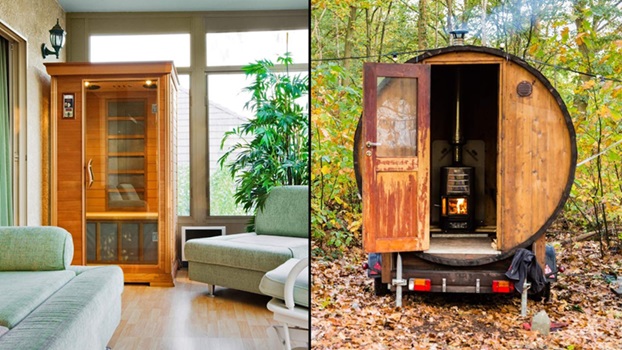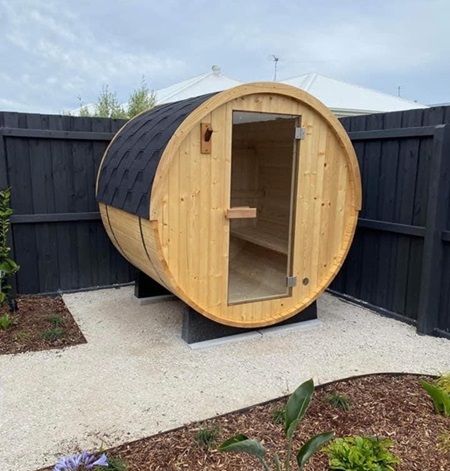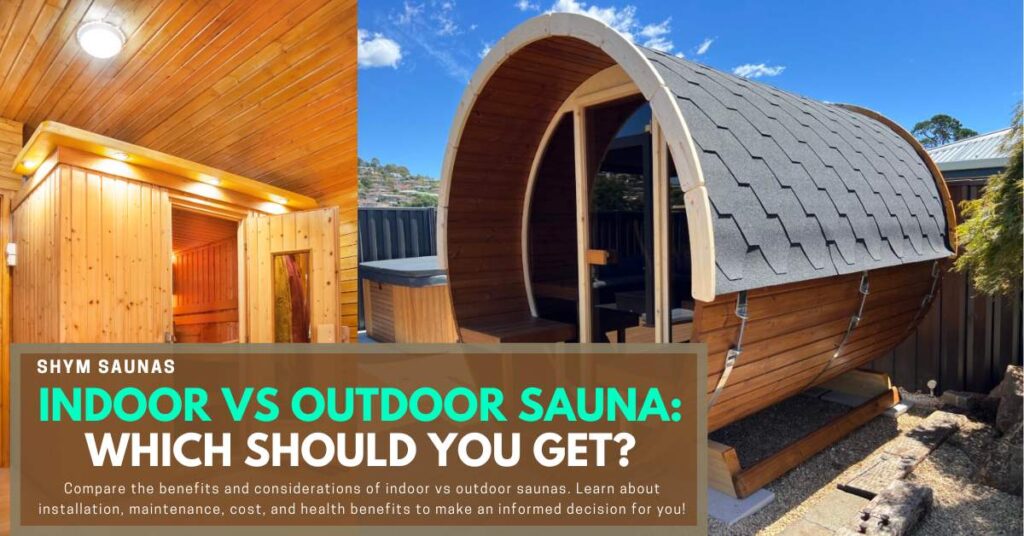The decision between an indoor versus an outdoor sauna is a significant one for homeowners contemplating adding a touch of luxury and wellness to their homes. However, choosing between an indoor and outdoor sauna can be challenging, with each option offering distinct advantages and considerations. This indoor vs outdoor sauna guide aims to provide a comprehensive comparison to help you make an informed choice.
Key Takeaways
- Indoor saunas are best for those prioritizing convenience and privacy, with considerations for space and ventilation.
- Outdoor saunas offer a more authentic experience with greater design flexibility but require more maintenance.
- Your choice should be guided by factors like space availability, budget, climate, and personal preference.
Key Differences Between an Indoor and Outdoor Sauna

Location and Installation
- Indoor Saunas: Typically built within the home’s infrastructure, such as in basements, bathrooms, or home gyms. They require careful consideration for ventilation and space but offer the convenience of accessibility in any weather.
- Outdoor Saunas: Installed outside the home, in the backyard, or near a pool or lake. They offer greater flexibility in terms of size and design, potentially enhancing the natural landscape but requiring a foundation and proper insulation against the elements.
Design and Customization
- Indoor Saunas: Often come in prefabricated kits for ease of installation, with options for custom designs during home renovations. The interior aesthetics can be closely aligned with the rest of the home’s decor.
- Outdoor Saunas: Provide more freedom in design, with options ranging from barrel, cabin, to raindrop-shaped models. They can incorporate large windows or glass doors for natural light and views of the surroundings.
Benefits and Considerations
- Indoor Saunas: Offer privacy and convenience, being easily accessible within your home. They’re less subjected to the wear and tear of harsh weather, making them potentially more durable.
- Outdoor Saunas: Allow for a more authentic sauna experience, especially if placed in a scenic outdoor setting. They require more maintenance due to exposure to weather conditions but can offer a more immersive relaxation experience.
Indoor vs Outdoor Sauna Pros and Cons
| Indoor Sauna | Outdoor Sauna | |
| Location | Built within the home, such as basements, bathrooms, or home gyms. | Installed outside the home, often in backyards or near natural water bodies. |
| Installation | May require modifications to existing rooms for ventilation and space. | Requires a foundation and proper insulation against outdoor elements. |
| Design | Limited by indoor space, but can seamlessly integrate with home decor. | Offers more design flexibility with options for unique shapes and sizes. |
| Customization | Prefabricated kits are common, with some custom options available. | Greater freedom in customization, including size, shape, and features. |
| Accessibility | Easily accessible in any weather condition. | May be affected by bad weather, but offers a closer connection to nature. |
| Privacy | Offers privacy within the comfort of your own home. | May provide less privacy depending on location and surroundings. |
| Ventilation | Requires careful consideration to avoid moisture buildup and heat damage. | Easier to ventilate in the open air, with less concern for indoor air quality. |
| Maintenance | Less exposure to the elements, potentially lower maintenance. | Requires more maintenance due to weather exposure and wear. |
| Experience | Convenient and private, suitable for any time use. | Offers a more authentic sauna experience, potentially with scenic views. |
| Cost | May be lower initially but consider the cost of home modifications. | Foundation and weatherproofing may increase initial costs. |
Indoor Sauna Pros:
- Accessibility: Use your sauna anytime, regardless of the weather outside.
- Privacy: Enjoy your sauna sessions without leaving the comfort of your home.
- Ease of Installation: Often easier to integrate into existing electrical and plumbing systems.
Indoor Sauna Cons:
- Space Limitations: May not be feasible for those with limited indoor space.
- Ventilation Challenges: Requires proper ventilation to avoid moisture and heat issues in your home.
Outdoor Sauna Pros:
- Customization: More flexibility in size, shape, and design.
- Natural Experience: Offers the chance to enjoy nature and potentially beautiful views.
- Ventilation: Naturally easier to ventilate in the open air.
Outdoor Sauna Cons:
- Weather Dependent: Accessibility can be hindered by bad weather.
- Maintenance: More exposed to the elements, requiring regular upkeep.
Making the Choice

When deciding on a sauna, several factors specific to either outdoor or indoor models can influence your choice. Below are considerations to keep in mind for each type.
What to Consider When Choosing an Outdoor Sauna
- Climate and Weather: The local climate is crucial as it affects the sauna’s maintenance needs and potential enjoyment. In harsh climates, consider the sauna’s durability and insulation capabilities.
- Landscape Integration: How the sauna will blend with or enhance your outdoor environment. The layout of your land can influence the sauna’s placement for optimal views and accessibility.
- Privacy: While being closer to nature is appealing, ensure your sauna placement offers privacy from neighbors or passersby. Strategic positioning or landscaping can provide seclusion.
- Local Regulations: Check local zoning laws and building codes to determine if there are restrictions on outdoor structures. Permits may be required for construction.
- Access to Utilities: Evaluate the feasibility of extending electrical lines and possibly water to the sauna location. These installations can significantly impact the overall cost.
- Maintenance: Outdoor saunas are exposed to the elements, necessitating regular upkeep to protect against weather damage. Consider the long-term commitment to maintaining the sauna’s exterior.
What to Consider When Choosing an Indoor Sauna
- Space Availability: Assess if you have suitable space within your home that can accommodate a sauna, keeping in mind the need for ventilation and heat protection.
- Ventilation: Proper ventilation is crucial to prevent moisture damage and maintain air quality. Plan for an exhaust system or an opening window within the sauna room.
- Installation Impact: Consider the implications of sauna installation on your home, including the potential need for structural modifications to accommodate weight, heat, and moisture.
- Ease of Use: An indoor sauna’s appeal often lies in its accessibility. Consider how often you plan to use the sauna and if having it readily accessible indoors aligns with your lifestyle.
- Aesthetic Integration: How the sauna design complements your home’s interior. An indoor sauna should ideally match or enhance your existing decor.
- Cost: Indoor saunas may require less structural preparation than outdoor ones, but retrofitting a room for sauna use can involve considerable expense, especially for ventilation and insulation.
FAQ
The initial cost can vary depending on several factors, including the size, materials, and whether you’re installing a prefabricated unit or custom-building your sauna. Outdoor saunas might require additional expenses for a foundation and weatherproofing, while indoor saunas may necessitate ventilation and insulation modifications. Generally, the overall costs are comparable, but specific installations could tip the scale either way.
Many outdoor saunas come in DIY kits that are designed for self-installation. If you’re handy and have basic construction skills, you could potentially install your outdoor sauna. However, for electrical connections and any complex construction, hiring professionals is recommended for safety and compliance with local codes.
Installation time varies based on the type of sauna, its location, and whether you’re doing it yourself or hiring professionals. Prefabricated saunas can often be assembled and installed over a weekend, while custom saunas may take several weeks to complete, especially if they require extensive site preparation or custom electrical work.
Yes, both indoor and outdoor saunas can add value to your home by enhancing its luxury appeal and wellness amenities. Indoor saunas, in particular, can be a selling point for buyers looking for premium in-home features. However, the actual impact on home value can vary by market and buyer interest.
Regular maintenance is key to preserving both indoor and outdoor saunas. For indoor saunas, ensure proper ventilation to avoid mold and mildew buildup and clean the interior surfaces regularly. Outdoor saunas require additional steps to protect against weather elements, including treating the wood exterior with a suitable protectant and checking for any weather-related damage periodically.
The health benefits of sauna use, such as improved circulation, relaxation, and detoxification, are generally consistent between indoor and outdoor saunas. However, an outdoor sauna might offer an enhanced relaxation experience due to its natural setting, potentially amplifying the mental health benefits associated with sauna use, like reduced stress and improved mood.
Absolutely! Outdoor saunas are popular in many cold climates, where the contrast between the hot sauna and cold outdoor air can be particularly invigorating. It’s important to ensure your outdoor sauna is well-insulated and designed for your specific climate to maximize comfort and energy efficiency.
Wrapping Up
Choosing between an indoor and outdoor sauna involves balancing the benefits and considerations of each option. Whether you opt for the convenience and privacy of an indoor sauna or the immersive experience of an outdoor sauna, the health and relaxation benefits remain a constant allure.



